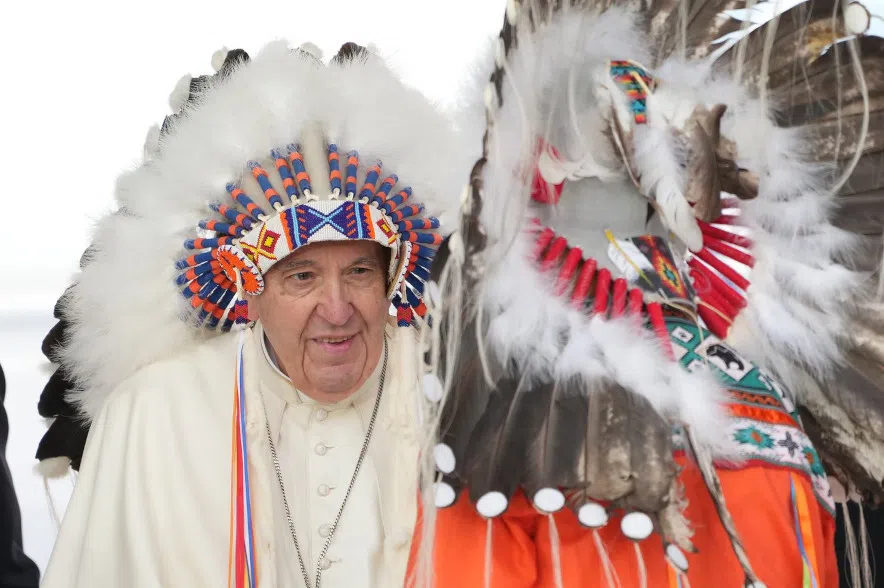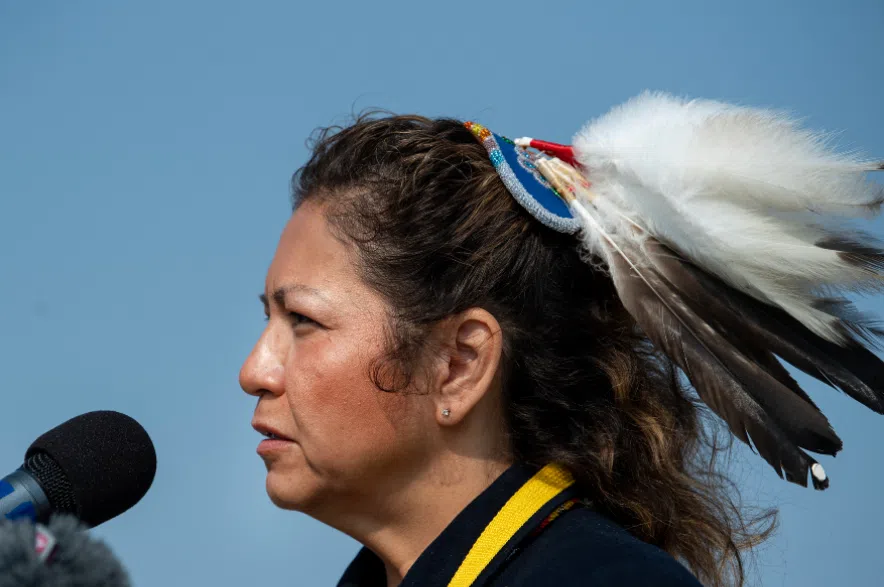As the world mourned the death of Pope Francis on Monday, Cowessess First Nation Chief Erica Beaudin remembered her trips to see him and his apologies for the Catholic church’s role in Canada’s residential schools.
Beaudin was part of the delegation of First Nations, Métis and Inuit peoples who travelled to the Vatican for meetings with Pope Francis in 2022.
She was one of two delegates from Saskatchewan who went to explain and show the effects of residential schools. Beaudin said the delegates met weekly for a year to plan for who would speak, what they would speak about and the themes therein.
“The delegation spoke to the Pope and it was only supposed to be an audience of about a half an hour and, in fact, he stayed with the delegation for almost two hours, regardless of what his schedule was, regardless of his advisers saying that ‘it’s time for us to go to our next appointments,’” Beaudin explained.
She thought taking the extra hour and a half showed the Pope’s sincerity.
The delegation went back to another meeting with him shortly after and Beaudin said he gave them an apology for the church’s role in residential schools.
“It was an incredible moment for us that we weren’t expecting,” said Beaudin.
“It was a … welcome surprise and it felt very meaningful and very personal in the way that the apology came out.”
Read more:
- None of Canada’s five cardinals likely to be next pope, Vatican experts say
- Pope Francis issues long-awaited apology for church’s role in residential schools

Pope Francis wears a traditional headdress he was given after his apology to Indigenous people during a ceremony in Maskwacis, Alta., as part of his papal visit across Canada in 2022. (THE CANADIAN PRESS/Nathan Denette)
Four months later, Pope Francis came to deliver apologies apologize for the Catholic Church’s role in residential schools on Canadian soil. Beaudin was part of the Saskatchewan group which went to the Edmonton event and said the pontiff spoke about the visit at the Vatican in his remarks.
“What he had spoke about was so personal and spoke to what the Indigenous leadership talked about and spoke about in that meeting that you knew that he heard and that he had actually wrote this himself.”
Beaudin said he talked about his own shame and the shame of the church for how Indigenous people were treated.
About a year later, Pope Francis also repudiated the Doctrine of Discovery, a religious concept held by the church that asserted the right of Christian explorers to claim land not inhabited by Christian peoples.
Beaudin said the apologies and the repudiation were significant ways Pope Francis was able to show his humility and ability to listen.
“As Pope he stepped outside what was expected or what was safe within the Roman Catholic Church and he did what he thought was right as the Pope, as the head of the church.”
Beaudin said it was incredible to be there when the apologies were made. She is a survivor of a residential school, but said her experiences were much different than those of her parents and grandparents.
She was clear that there were mixed emotions through the whole process and the situation is complex — that every Indigenous person has a different experience and one person’s experience doesn’t add or lessen the hurt and pain of others.
“As First Nations, Métis and Inuit people, we acknowledge that the legacy of the church and their connection between the government and the Indian Agency and the church, working together with genocidal policies — that it is very, very hard for us to process and to get to a place of healing,” said Beaudin.
She said she was sad at the 88-year-old Pope’s death on Sunday.
“He had incredible humility and there was a sense of peace and a sense of holiness about him. That is one of the feelings that I’ll always remember, being in his presence.”
Beaudin said she hopes the Catholic church will choose a successor who embodies the same traits and commitment to following God’s teachings.
— with files from The Canadian Press











